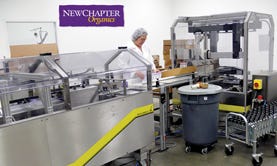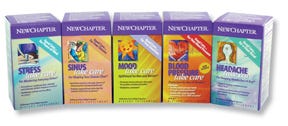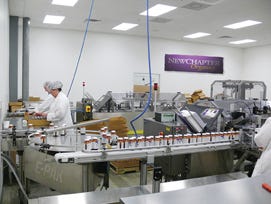Cartoners, case packers open a New Chapter
February 4, 2014

At New Chapter's Brattleboro, VT, plant, loaded cartons exit fro mthe cartoner and are collated automatically before being case-packed.
With a mission to "deliver the wisdom of nature" through the finest herbal supplements and probiotic nutrients it can make, New Chapter, Inc., a Brattleboro, VT, certified organic manufacturer of whole-food vitamins, minerals and supplements, didn't use secondary packaging for some time, but recently chose to pack its bottles of product in folding cartons to strengthen its brand presence in the market and on the store shelf. Founded in 1982 by Paul and Barbi Schulick, New Chapter could be considered the natural foods industry's answer to Ben & Jerry's. Its supplements include those for treating stress, headaches, blood pressure, mood, the sinuses and more. Its whole-food probiotic nutrients are cultured in organic soy, and it offers a large line of herbal therapeutics, a line of vegetarian "super food" probiotic capsules called Berry Green® and a line of tonics and topicals and it operates a biodynamic (organic and spiritual) farm near the Children's Rain Forest in Costa Rica. According to its website, the company's products are truly natural, made of 100-percent real food and herbs. Its extensive recycling, energy-conservation measures and environmentally preferable purchasing practices have earned state recognition.
Read how labor-saving cartoning equipment handles the output from two plants owned by The Original Rangoon Co. at www.packagingdigest.com/info/rangoon
In fact, cofounder Barbi Schulick is the company's director of sustainability, helping to assure that the founding values of the company continue to thrive. New Chapter recycles much of its solid waste, including paperboard and paper, glass containers and pallets and also "closes the loop," by purchasing recycled paper products and printing catalogs on 100-percent post-consumer-recycled (PCR) paper.

A vailable in the "natural channel" of fine natural food retailers such as Whole Foods, Wild Oats, the Vitamin Shoppe and many others, the products come in glass bottles in five sizes, from 74 cc to 450 cc. The company has seen noticeable improvements in shelf presence since adding the cartons. The cartons create a strong brand block when merchandised together, which the company says communicates the breadth of the product lines to consumers. In fact, the cartons have helped to increase product sales, notes Graham Rigby, director of marketing. "It's difficult to isolate the impact of the cartoning on growth, but it's worth saying that the presence afforded to New Chapter from our packaging has helped drive our double-digit, compound annual growth over the past several years." New Chapter started out erecting the cartons by hand until it opened a "new chapter" in the book of its packaging operation by adopting the Spartan automatic cartoner from Econocorp and later Econocorp's Econopacker case packers and Twinseal sealers. The decision to automate the cartoning process came from the dramatic growth New Chapter has experienced in recent years. The production team attempted to respond to this growth by adding more manual labor at the cartoning station, but the team says it was unable to consistently keep up with product demand, despite the increase in resources.
The return on the investment for automatic cartoning has been very convincing. New Chapter estimated that it would pay for the equipment through a labor reduction and increased efficiency within six months of purchase.

Automation not only allows us to keep up with increasing business demand, but it allows us to gain efficiencies.
"We chose to automate the packaging line in efforts to increase productivity and to gain efficiency," says Meg Kilroy, assistant director of operations. "Automation not only allows us to keep up with increasing business demand, but it also allows us to gain further efficiencies. For example, we can now perform the same packaging function—and more—in half the time," she says. The packaging team learned about Econocorp while researching cartoning equipment on the Internet. The team knew Econocorp was established as a cartoning equipment supplier, but was pleasantly surprised to discover that it's a local New England business. Upon initial project discussions, New Chapter decided that Econocorp had what it needed for the automation project.
"Econocorp offered equipment that was basic, affordable and durable," Kilroy points out. "And its geographical location was easily accessible for our first automated equipment implementation." The New Chapter team says it finds the horizontal Spartan machine to be user friendly. The intermittent-motion system is equipped with PLC controls and a remote-control panel. It's rated to have a top speed of up to 2,400 cartons/hr.
In New Chapter's case, it's not unusual to run three or four different container sizes in a given shift at a typical production rate of approximately 2,000 cartons/hr or 32 to 34 bottles/min, Rigby says.

Supplement bottles convey to one of the new cartoners on the packaging line and are automatically placed in paperboard folding cartons.
Changeovers from one size carton to another take about 30 min. The carton magazine is specifically designed for New Chapter's individual carton sizes. Once it is removed, another magazine configuration is installed. The remaining steps involve making adjustments for a specific carton size to be run. Kilroy says the production team has experienced little downtime due to repairs or maintenance. "Econocorp has been quick to respond to our questions and concerns, and it has been a pleasure working with them," she says. "We received a lot of personal attention." The company has since purchased an additional Spartan cartoner, as well as two Econopacker case packers and one semi-automatic Twinseal carton sealer. "We have a diverse operation that includes both automated and semi-automatic equipment," adds Rigby. "Before May 2006, our only automatic piece of equipment was the Spartan. The rest of our packaging was done using manually operated labeling and filling equipment. Cottoning, capping and sealing were all done entirely by hand. " Today, there are three separate packaging lines, Rigby says, all of which are in keeping with the company's sustainability efforts.
"We continually strive to make both our packaging concepts and our packaging operation more sustainable," he tells PD. "Minimizing energy consumption, we strictly observe facility SOP of turning all equipment off while it's not in use. We installed timers on the equipment that require a warmup to guarantee that the operation can be up and running at the beginning of each shift without our having to leave the equipment on during off-hours," he says. "We are also working with our packaging suppliers to consider ways in which we can receive packaging components with minimal secondary packaging," he continues. "Our goal is to decrease the solid waste that our operation generates. We're also in the process of adopting all shipping supplies made of one-hundred-percent post-consumer-recycled corrugated containers over the next few months." Attractively process-printed in four vibrant colors using vegetable oil-based inks, the 100-percent-recyclable glued-end folding cartons are made by Boutwell Owens and Disc Graphics of .014 and .016 SBS, respectively. One fully automated packaging line fills, inserts cotton, caps, seals and labels bottles before sending them to one of the Spartan machines. The second line is semi-automatic, used prior to the company's automation projects that automatically capped and sealed the bottles before being sending them to the second Spartan cartoning machine. The third line is mostly manual and is suitable for low-volume products and special projects, and is outfitted with the semi-automatic Twinseal machine.
The two Spartan systems are arranged to accept an incoming flow of bottles. They proceed to knock each bottle down on its side as it is loaded horizontally into an automatically erected and positioned carton at the loading station. With some products, an informational leaflet is also automatically "bull-nosed" around the cap of the bottle during the loading sequence. The loaded cartons are then coded with an expiration date and lot code on one end flap using thermal-transfer printers supplied by Markem and are sealed using hot-melt adhesive purchased through R.P. Morrison Co.. The sealed cartons running on these two lines are then automatically case-packed in counts of 12 into a corrugated master shipping case by the semi-automatic, horizontal Econopackers. The shippers are tape-sealed on Little David equipment from Loveshaw.
According to Kilroy, New Chapter continues to turn the pages of its environmental efforts and packaging automation story. "We decided to stay with Econocorp throughout our packaging equipment automation process because of the quality of their equipment and the continuous support we receive," she says. "Our team is still new to much of the automatic equipment, but Econocorp's expertise and support have helped bring our operation from one level to another level." Adds Rigby. "New Chapter's distinct product formulations are nutrition harnessed from cultured, whole food, not chemical isolates, and require significant education for consumers to understand why they're different. In an intensely competitive industry, we must balance sustainability efforts along with a need to educate consumers and communicate key product attributes. The decision to add a secondary carton helped immensely. We're committed to sustainable practices in every aspect of business."
More information is available:
Econocorp, Inc., 781/986-7500 www.econocorp.com.
Boutwell Owens, 978/343-3067 www.boutwellowens.com.
Disc Graphics, 631/234-1400 www. discgraphics.com.
Loveshaw Corp., an ITW co., 800/572-3434 www.loveshaw.com.
Markem Corp., 866/263-4644. www.markem.com.
R.P. Morrison Co. 401/295-3100. www.rpmorrison.com.
About the Author(s)
You May Also Like


